Organisational Behaviour: Motivation, Team Performance in Tesco HND
VerifiedAdded on 2023/01/10
|19
|4760
|33
Report
AI Summary
This report delves into the multifaceted aspects of organisational behaviour within the context of Tesco, a multinational retail organisation. It examines the influence of power, culture, and politics on individual and team performance, referencing Handy's model of organisational culture (power, task, person, and role cultures) and French & Raven's power dynamics (legitimate, reward, coercive, expert, and referent power). The report also explores motivational theories, including Maslow's hierarchy of needs and Herzberg's motivation-hygiene theory, alongside Vroom's expectancy theory, to understand how to enhance employee motivation and satisfaction. Furthermore, it contrasts effective and ineffective teams, highlighting the importance of participative leadership and continuous employee appraisal for improved performance. The analysis concludes with recommendations for Tesco to foster a more positive and productive work environment.
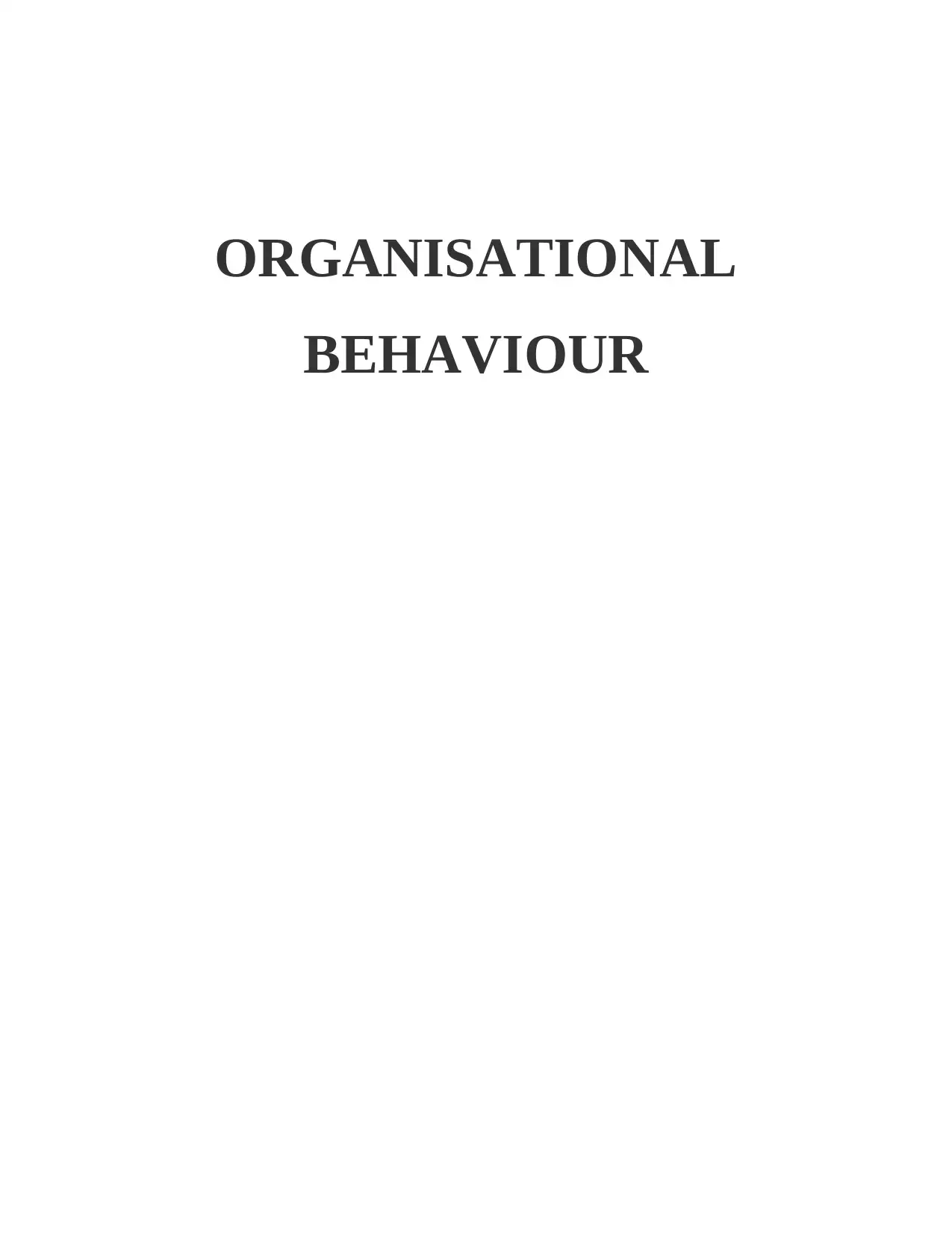
ORGANISATIONAL
BEHAVIOUR
BEHAVIOUR
Paraphrase This Document
Need a fresh take? Get an instant paraphrase of this document with our AI Paraphraser
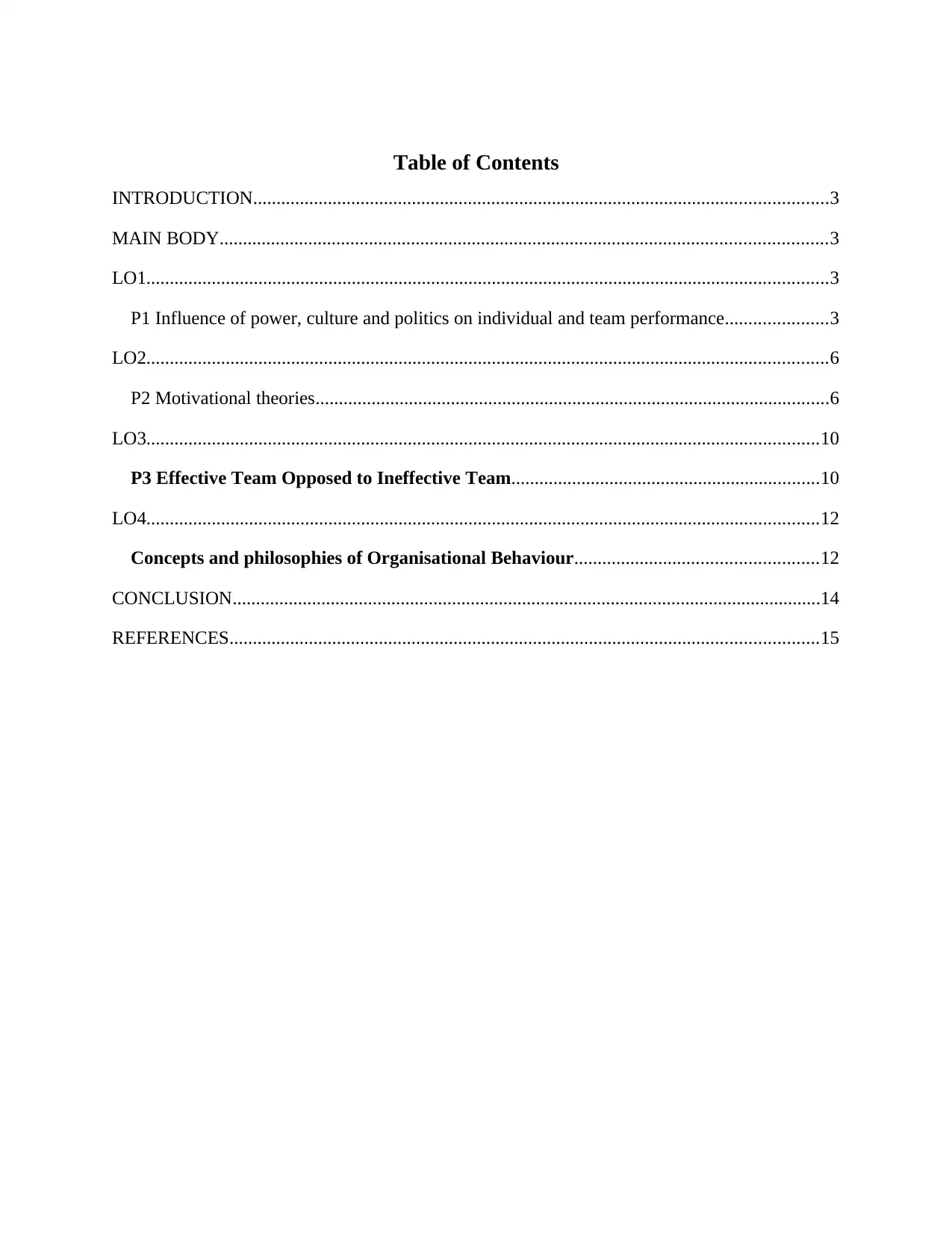
Table of Contents
INTRODUCTION...........................................................................................................................3
MAIN BODY..................................................................................................................................3
LO1..................................................................................................................................................3
P1 Influence of power, culture and politics on individual and team performance......................3
LO2..................................................................................................................................................6
P2 Motivational theories..............................................................................................................6
LO3................................................................................................................................................10
P3 Effective Team Opposed to Ineffective Team..................................................................10
LO4................................................................................................................................................12
Concepts and philosophies of Organisational Behaviour....................................................12
CONCLUSION..............................................................................................................................14
REFERENCES..............................................................................................................................15
INTRODUCTION...........................................................................................................................3
MAIN BODY..................................................................................................................................3
LO1..................................................................................................................................................3
P1 Influence of power, culture and politics on individual and team performance......................3
LO2..................................................................................................................................................6
P2 Motivational theories..............................................................................................................6
LO3................................................................................................................................................10
P3 Effective Team Opposed to Ineffective Team..................................................................10
LO4................................................................................................................................................12
Concepts and philosophies of Organisational Behaviour....................................................12
CONCLUSION..............................................................................................................................14
REFERENCES..............................................................................................................................15
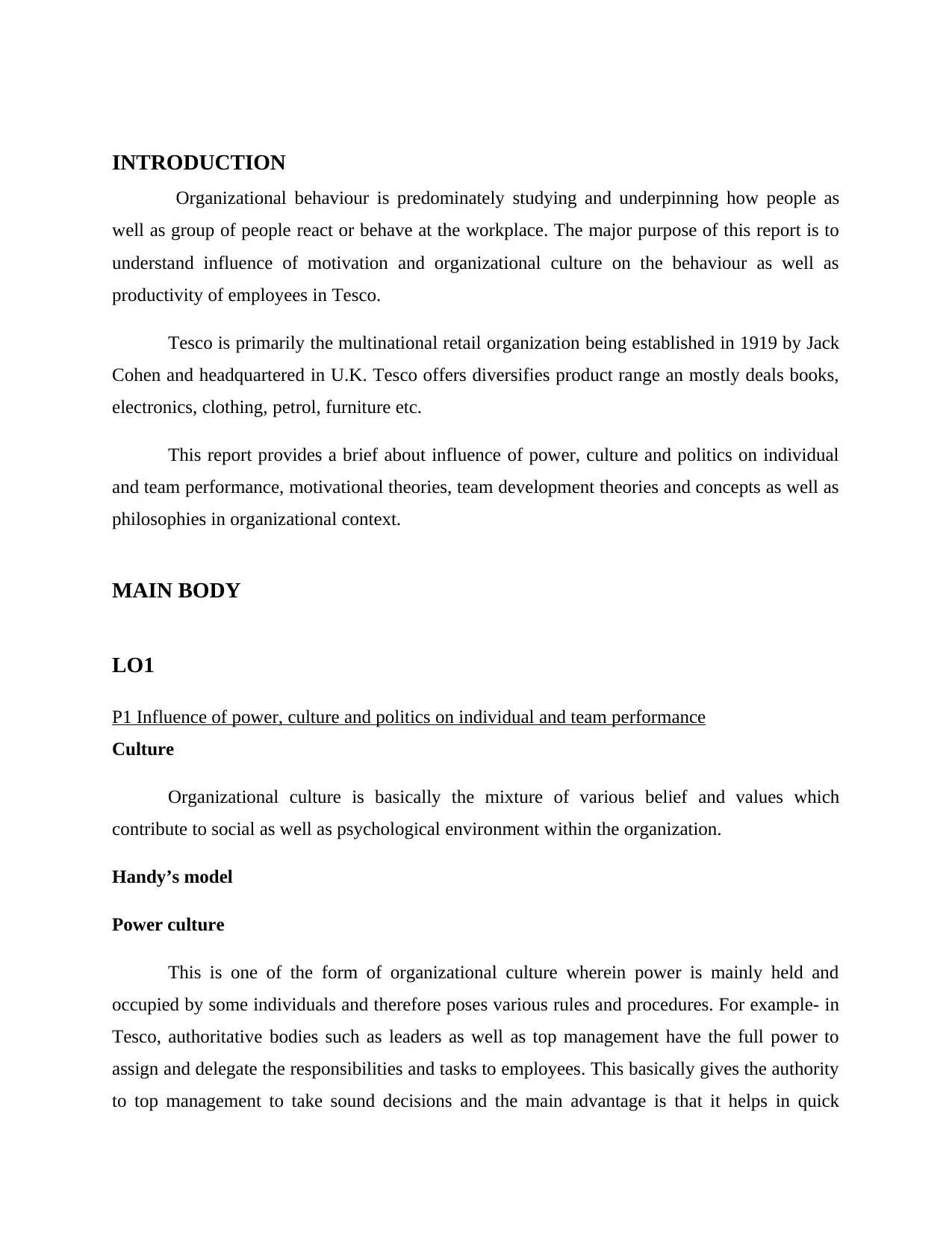
INTRODUCTION
Organizational behaviour is predominately studying and underpinning how people as
well as group of people react or behave at the workplace. The major purpose of this report is to
understand influence of motivation and organizational culture on the behaviour as well as
productivity of employees in Tesco.
Tesco is primarily the multinational retail organization being established in 1919 by Jack
Cohen and headquartered in U.K. Tesco offers diversifies product range an mostly deals books,
electronics, clothing, petrol, furniture etc.
This report provides a brief about influence of power, culture and politics on individual
and team performance, motivational theories, team development theories and concepts as well as
philosophies in organizational context.
MAIN BODY
LO1
P1 Influence of power, culture and politics on individual and team performance
Culture
Organizational culture is basically the mixture of various belief and values which
contribute to social as well as psychological environment within the organization.
Handy’s model
Power culture
This is one of the form of organizational culture wherein power is mainly held and
occupied by some individuals and therefore poses various rules and procedures. For example- in
Tesco, authoritative bodies such as leaders as well as top management have the full power to
assign and delegate the responsibilities and tasks to employees. This basically gives the authority
to top management to take sound decisions and the main advantage is that it helps in quick
Organizational behaviour is predominately studying and underpinning how people as
well as group of people react or behave at the workplace. The major purpose of this report is to
understand influence of motivation and organizational culture on the behaviour as well as
productivity of employees in Tesco.
Tesco is primarily the multinational retail organization being established in 1919 by Jack
Cohen and headquartered in U.K. Tesco offers diversifies product range an mostly deals books,
electronics, clothing, petrol, furniture etc.
This report provides a brief about influence of power, culture and politics on individual
and team performance, motivational theories, team development theories and concepts as well as
philosophies in organizational context.
MAIN BODY
LO1
P1 Influence of power, culture and politics on individual and team performance
Culture
Organizational culture is basically the mixture of various belief and values which
contribute to social as well as psychological environment within the organization.
Handy’s model
Power culture
This is one of the form of organizational culture wherein power is mainly held and
occupied by some individuals and therefore poses various rules and procedures. For example- in
Tesco, authoritative bodies such as leaders as well as top management have the full power to
assign and delegate the responsibilities and tasks to employees. This basically gives the authority
to top management to take sound decisions and the main advantage is that it helps in quick
⊘ This is a preview!⊘
Do you want full access?
Subscribe today to unlock all pages.

Trusted by 1+ million students worldwide
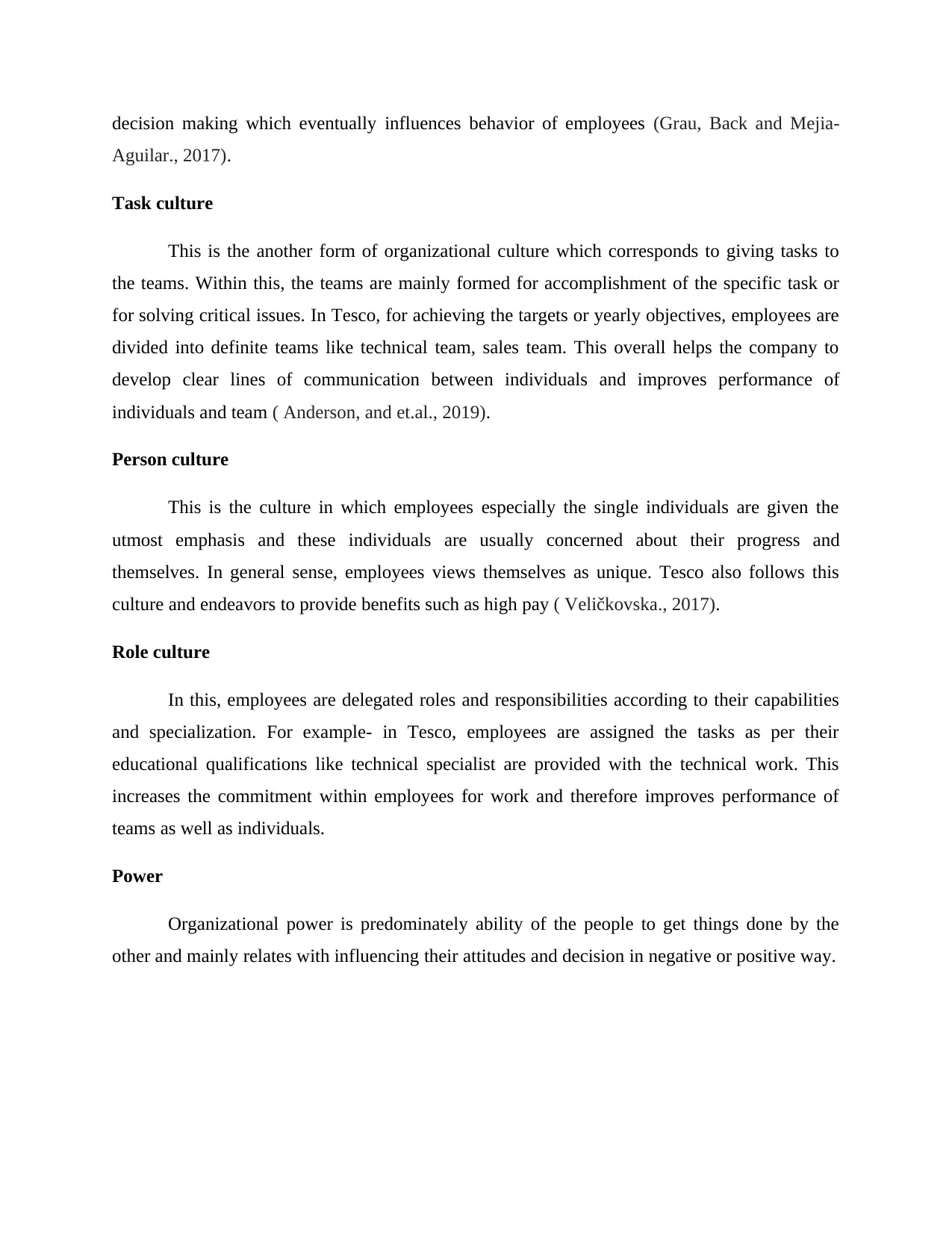
decision making which eventually influences behavior of employees (Grau, Back and Mejia-
Aguilar., 2017).
Task culture
This is the another form of organizational culture which corresponds to giving tasks to
the teams. Within this, the teams are mainly formed for accomplishment of the specific task or
for solving critical issues. In Tesco, for achieving the targets or yearly objectives, employees are
divided into definite teams like technical team, sales team. This overall helps the company to
develop clear lines of communication between individuals and improves performance of
individuals and team ( Anderson, and et.al., 2019).
Person culture
This is the culture in which employees especially the single individuals are given the
utmost emphasis and these individuals are usually concerned about their progress and
themselves. In general sense, employees views themselves as unique. Tesco also follows this
culture and endeavors to provide benefits such as high pay ( Veličkovska., 2017).
Role culture
In this, employees are delegated roles and responsibilities according to their capabilities
and specialization. For example- in Tesco, employees are assigned the tasks as per their
educational qualifications like technical specialist are provided with the technical work. This
increases the commitment within employees for work and therefore improves performance of
teams as well as individuals.
Power
Organizational power is predominately ability of the people to get things done by the
other and mainly relates with influencing their attitudes and decision in negative or positive way.
Aguilar., 2017).
Task culture
This is the another form of organizational culture which corresponds to giving tasks to
the teams. Within this, the teams are mainly formed for accomplishment of the specific task or
for solving critical issues. In Tesco, for achieving the targets or yearly objectives, employees are
divided into definite teams like technical team, sales team. This overall helps the company to
develop clear lines of communication between individuals and improves performance of
individuals and team ( Anderson, and et.al., 2019).
Person culture
This is the culture in which employees especially the single individuals are given the
utmost emphasis and these individuals are usually concerned about their progress and
themselves. In general sense, employees views themselves as unique. Tesco also follows this
culture and endeavors to provide benefits such as high pay ( Veličkovska., 2017).
Role culture
In this, employees are delegated roles and responsibilities according to their capabilities
and specialization. For example- in Tesco, employees are assigned the tasks as per their
educational qualifications like technical specialist are provided with the technical work. This
increases the commitment within employees for work and therefore improves performance of
teams as well as individuals.
Power
Organizational power is predominately ability of the people to get things done by the
other and mainly relates with influencing their attitudes and decision in negative or positive way.
Paraphrase This Document
Need a fresh take? Get an instant paraphrase of this document with our AI Paraphraser
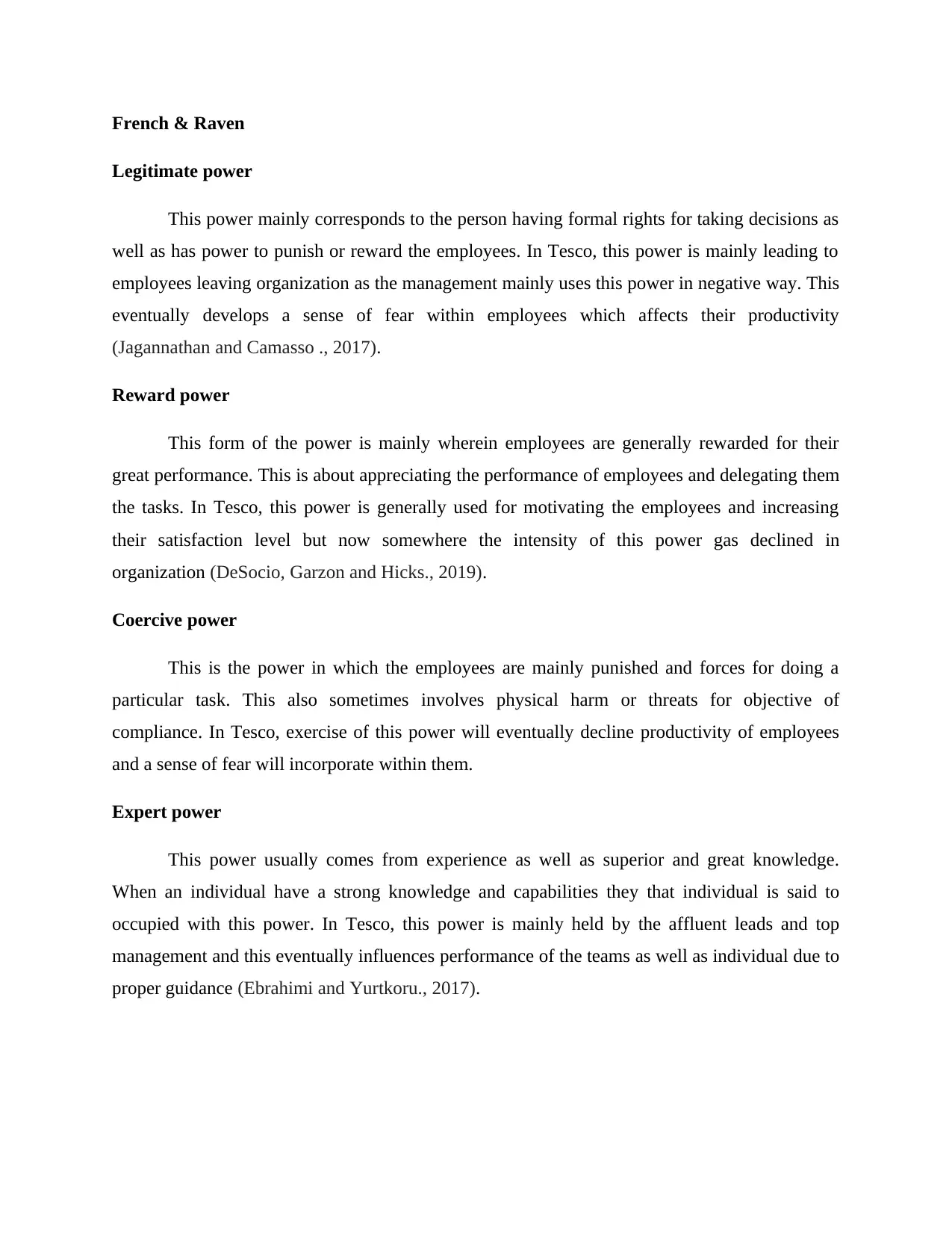
French & Raven
Legitimate power
This power mainly corresponds to the person having formal rights for taking decisions as
well as has power to punish or reward the employees. In Tesco, this power is mainly leading to
employees leaving organization as the management mainly uses this power in negative way. This
eventually develops a sense of fear within employees which affects their productivity
(Jagannathan and Camasso ., 2017).
Reward power
This form of the power is mainly wherein employees are generally rewarded for their
great performance. This is about appreciating the performance of employees and delegating them
the tasks. In Tesco, this power is generally used for motivating the employees and increasing
their satisfaction level but now somewhere the intensity of this power gas declined in
organization (DeSocio, Garzon and Hicks., 2019).
Coercive power
This is the power in which the employees are mainly punished and forces for doing a
particular task. This also sometimes involves physical harm or threats for objective of
compliance. In Tesco, exercise of this power will eventually decline productivity of employees
and a sense of fear will incorporate within them.
Expert power
This power usually comes from experience as well as superior and great knowledge.
When an individual have a strong knowledge and capabilities they that individual is said to
occupied with this power. In Tesco, this power is mainly held by the affluent leads and top
management and this eventually influences performance of the teams as well as individual due to
proper guidance (Ebrahimi and Yurtkoru., 2017).
Legitimate power
This power mainly corresponds to the person having formal rights for taking decisions as
well as has power to punish or reward the employees. In Tesco, this power is mainly leading to
employees leaving organization as the management mainly uses this power in negative way. This
eventually develops a sense of fear within employees which affects their productivity
(Jagannathan and Camasso ., 2017).
Reward power
This form of the power is mainly wherein employees are generally rewarded for their
great performance. This is about appreciating the performance of employees and delegating them
the tasks. In Tesco, this power is generally used for motivating the employees and increasing
their satisfaction level but now somewhere the intensity of this power gas declined in
organization (DeSocio, Garzon and Hicks., 2019).
Coercive power
This is the power in which the employees are mainly punished and forces for doing a
particular task. This also sometimes involves physical harm or threats for objective of
compliance. In Tesco, exercise of this power will eventually decline productivity of employees
and a sense of fear will incorporate within them.
Expert power
This power usually comes from experience as well as superior and great knowledge.
When an individual have a strong knowledge and capabilities they that individual is said to
occupied with this power. In Tesco, this power is mainly held by the affluent leads and top
management and this eventually influences performance of the teams as well as individual due to
proper guidance (Ebrahimi and Yurtkoru., 2017).
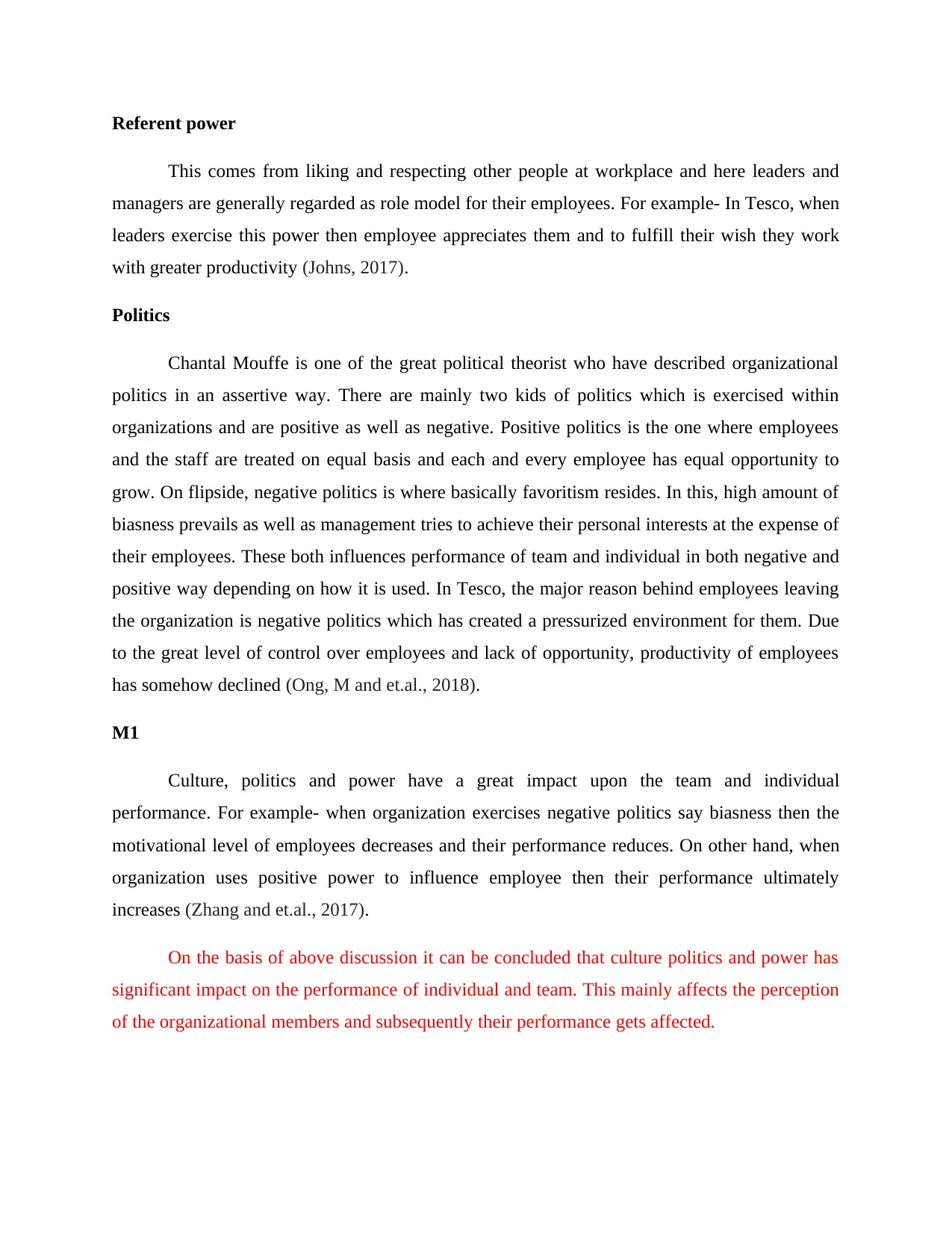
Referent power
This comes from liking and respecting other people at workplace and here leaders and
managers are generally regarded as role model for their employees. For example- In Tesco, when
leaders exercise this power then employee appreciates them and to fulfill their wish they work
with greater productivity (Johns, 2017).
Politics
Chantal Mouffe is one of the great political theorist who have described organizational
politics in an assertive way. There are mainly two kids of politics which is exercised within
organizations and are positive as well as negative. Positive politics is the one where employees
and the staff are treated on equal basis and each and every employee has equal opportunity to
grow. On flipside, negative politics is where basically favoritism resides. In this, high amount of
biasness prevails as well as management tries to achieve their personal interests at the expense of
their employees. These both influences performance of team and individual in both negative and
positive way depending on how it is used. In Tesco, the major reason behind employees leaving
the organization is negative politics which has created a pressurized environment for them. Due
to the great level of control over employees and lack of opportunity, productivity of employees
has somehow declined (Ong, M and et.al., 2018).
M1
Culture, politics and power have a great impact upon the team and individual
performance. For example- when organization exercises negative politics say biasness then the
motivational level of employees decreases and their performance reduces. On other hand, when
organization uses positive power to influence employee then their performance ultimately
increases (Zhang and et.al., 2017).
On the basis of above discussion it can be concluded that culture politics and power has
significant impact on the performance of individual and team. This mainly affects the perception
of the organizational members and subsequently their performance gets affected.
This comes from liking and respecting other people at workplace and here leaders and
managers are generally regarded as role model for their employees. For example- In Tesco, when
leaders exercise this power then employee appreciates them and to fulfill their wish they work
with greater productivity (Johns, 2017).
Politics
Chantal Mouffe is one of the great political theorist who have described organizational
politics in an assertive way. There are mainly two kids of politics which is exercised within
organizations and are positive as well as negative. Positive politics is the one where employees
and the staff are treated on equal basis and each and every employee has equal opportunity to
grow. On flipside, negative politics is where basically favoritism resides. In this, high amount of
biasness prevails as well as management tries to achieve their personal interests at the expense of
their employees. These both influences performance of team and individual in both negative and
positive way depending on how it is used. In Tesco, the major reason behind employees leaving
the organization is negative politics which has created a pressurized environment for them. Due
to the great level of control over employees and lack of opportunity, productivity of employees
has somehow declined (Ong, M and et.al., 2018).
M1
Culture, politics and power have a great impact upon the team and individual
performance. For example- when organization exercises negative politics say biasness then the
motivational level of employees decreases and their performance reduces. On other hand, when
organization uses positive power to influence employee then their performance ultimately
increases (Zhang and et.al., 2017).
On the basis of above discussion it can be concluded that culture politics and power has
significant impact on the performance of individual and team. This mainly affects the perception
of the organizational members and subsequently their performance gets affected.
⊘ This is a preview!⊘
Do you want full access?
Subscribe today to unlock all pages.

Trusted by 1+ million students worldwide
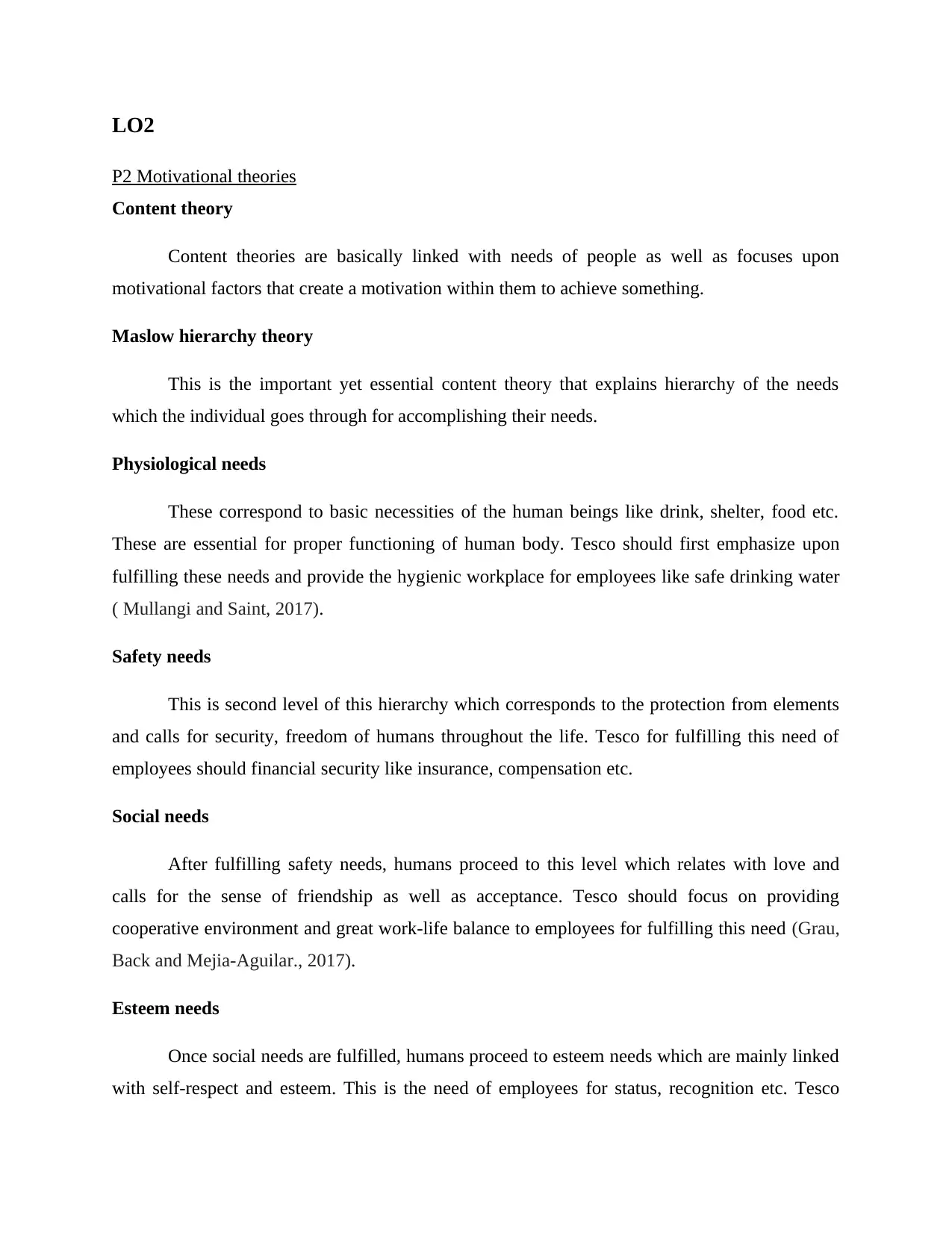
LO2
P2 Motivational theories
Content theory
Content theories are basically linked with needs of people as well as focuses upon
motivational factors that create a motivation within them to achieve something.
Maslow hierarchy theory
This is the important yet essential content theory that explains hierarchy of the needs
which the individual goes through for accomplishing their needs.
Physiological needs
These correspond to basic necessities of the human beings like drink, shelter, food etc.
These are essential for proper functioning of human body. Tesco should first emphasize upon
fulfilling these needs and provide the hygienic workplace for employees like safe drinking water
( Mullangi and Saint, 2017).
Safety needs
This is second level of this hierarchy which corresponds to the protection from elements
and calls for security, freedom of humans throughout the life. Tesco for fulfilling this need of
employees should financial security like insurance, compensation etc.
Social needs
After fulfilling safety needs, humans proceed to this level which relates with love and
calls for the sense of friendship as well as acceptance. Tesco should focus on providing
cooperative environment and great work-life balance to employees for fulfilling this need (Grau,
Back and Mejia-Aguilar., 2017).
Esteem needs
Once social needs are fulfilled, humans proceed to esteem needs which are mainly linked
with self-respect and esteem. This is the need of employees for status, recognition etc. Tesco
P2 Motivational theories
Content theory
Content theories are basically linked with needs of people as well as focuses upon
motivational factors that create a motivation within them to achieve something.
Maslow hierarchy theory
This is the important yet essential content theory that explains hierarchy of the needs
which the individual goes through for accomplishing their needs.
Physiological needs
These correspond to basic necessities of the human beings like drink, shelter, food etc.
These are essential for proper functioning of human body. Tesco should first emphasize upon
fulfilling these needs and provide the hygienic workplace for employees like safe drinking water
( Mullangi and Saint, 2017).
Safety needs
This is second level of this hierarchy which corresponds to the protection from elements
and calls for security, freedom of humans throughout the life. Tesco for fulfilling this need of
employees should financial security like insurance, compensation etc.
Social needs
After fulfilling safety needs, humans proceed to this level which relates with love and
calls for the sense of friendship as well as acceptance. Tesco should focus on providing
cooperative environment and great work-life balance to employees for fulfilling this need (Grau,
Back and Mejia-Aguilar., 2017).
Esteem needs
Once social needs are fulfilled, humans proceed to esteem needs which are mainly linked
with self-respect and esteem. This is the need of employees for status, recognition etc. Tesco
Paraphrase This Document
Need a fresh take? Get an instant paraphrase of this document with our AI Paraphraser
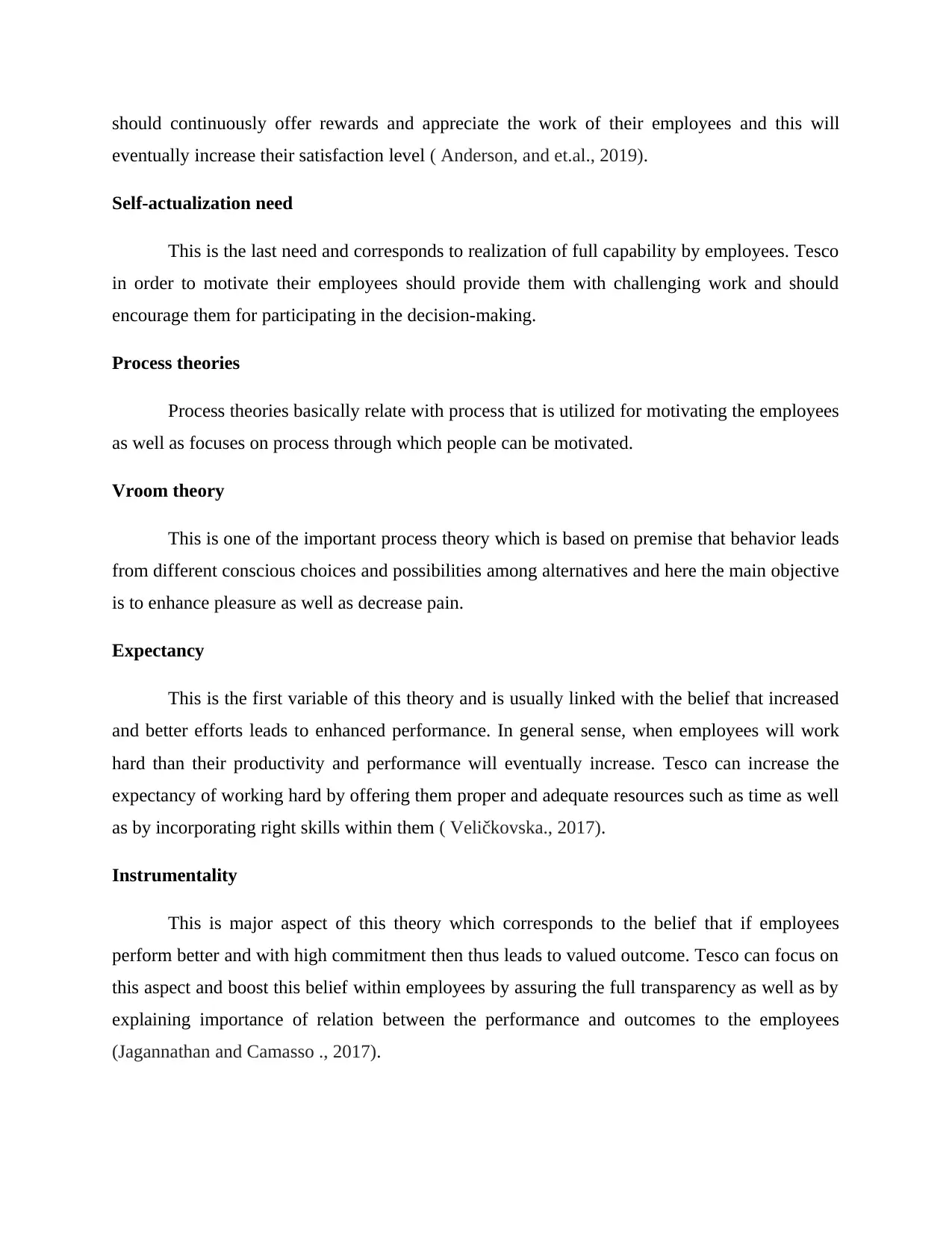
should continuously offer rewards and appreciate the work of their employees and this will
eventually increase their satisfaction level ( Anderson, and et.al., 2019).
Self-actualization need
This is the last need and corresponds to realization of full capability by employees. Tesco
in order to motivate their employees should provide them with challenging work and should
encourage them for participating in the decision-making.
Process theories
Process theories basically relate with process that is utilized for motivating the employees
as well as focuses on process through which people can be motivated.
Vroom theory
This is one of the important process theory which is based on premise that behavior leads
from different conscious choices and possibilities among alternatives and here the main objective
is to enhance pleasure as well as decrease pain.
Expectancy
This is the first variable of this theory and is usually linked with the belief that increased
and better efforts leads to enhanced performance. In general sense, when employees will work
hard than their productivity and performance will eventually increase. Tesco can increase the
expectancy of working hard by offering them proper and adequate resources such as time as well
as by incorporating right skills within them ( Veličkovska., 2017).
Instrumentality
This is major aspect of this theory which corresponds to the belief that if employees
perform better and with high commitment then thus leads to valued outcome. Tesco can focus on
this aspect and boost this belief within employees by assuring the full transparency as well as by
explaining importance of relation between the performance and outcomes to the employees
(Jagannathan and Camasso ., 2017).
eventually increase their satisfaction level ( Anderson, and et.al., 2019).
Self-actualization need
This is the last need and corresponds to realization of full capability by employees. Tesco
in order to motivate their employees should provide them with challenging work and should
encourage them for participating in the decision-making.
Process theories
Process theories basically relate with process that is utilized for motivating the employees
as well as focuses on process through which people can be motivated.
Vroom theory
This is one of the important process theory which is based on premise that behavior leads
from different conscious choices and possibilities among alternatives and here the main objective
is to enhance pleasure as well as decrease pain.
Expectancy
This is the first variable of this theory and is usually linked with the belief that increased
and better efforts leads to enhanced performance. In general sense, when employees will work
hard than their productivity and performance will eventually increase. Tesco can increase the
expectancy of working hard by offering them proper and adequate resources such as time as well
as by incorporating right skills within them ( Veličkovska., 2017).
Instrumentality
This is major aspect of this theory which corresponds to the belief that if employees
perform better and with high commitment then thus leads to valued outcome. Tesco can focus on
this aspect and boost this belief within employees by assuring the full transparency as well as by
explaining importance of relation between the performance and outcomes to the employees
(Jagannathan and Camasso ., 2017).
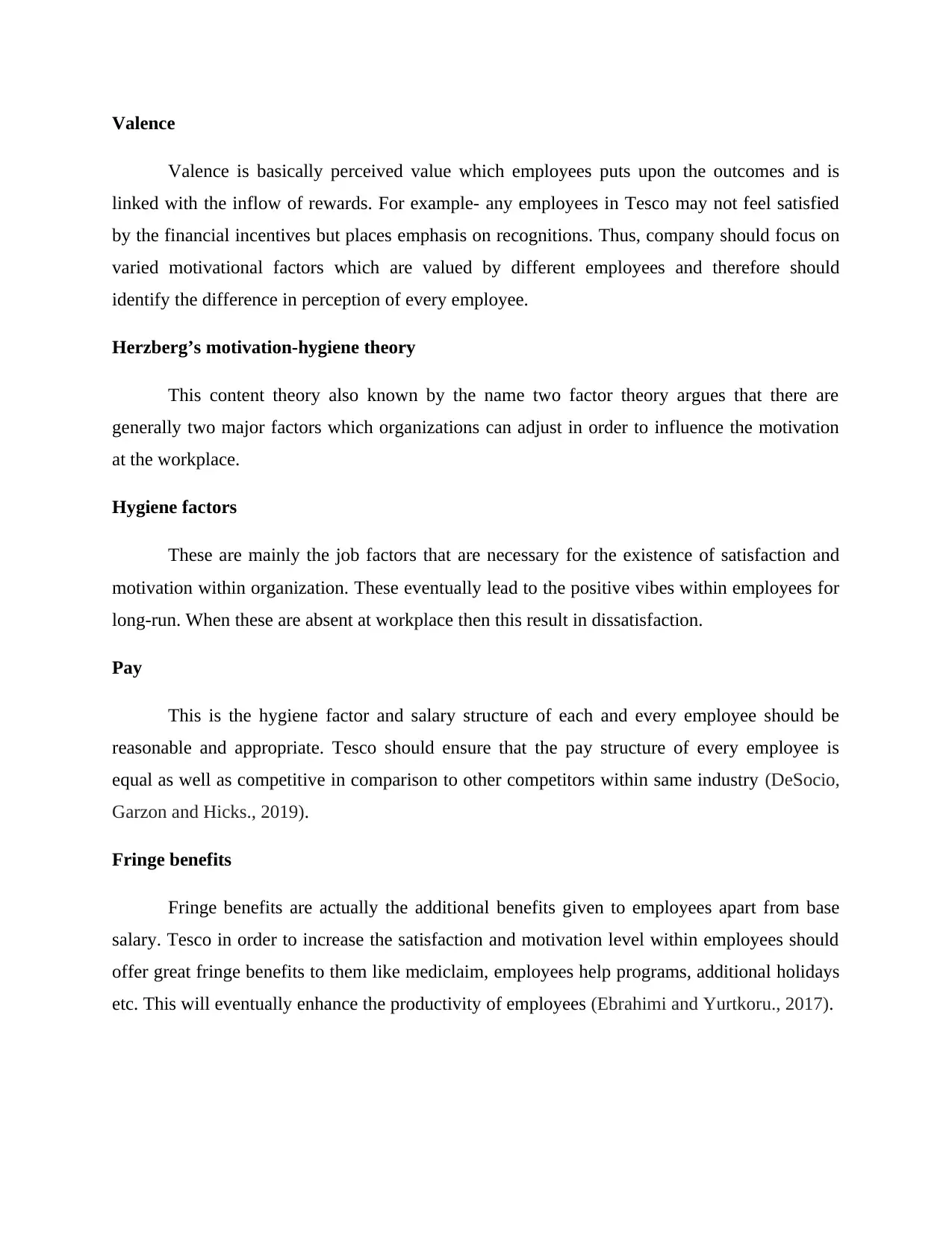
Valence
Valence is basically perceived value which employees puts upon the outcomes and is
linked with the inflow of rewards. For example- any employees in Tesco may not feel satisfied
by the financial incentives but places emphasis on recognitions. Thus, company should focus on
varied motivational factors which are valued by different employees and therefore should
identify the difference in perception of every employee.
Herzberg’s motivation-hygiene theory
This content theory also known by the name two factor theory argues that there are
generally two major factors which organizations can adjust in order to influence the motivation
at the workplace.
Hygiene factors
These are mainly the job factors that are necessary for the existence of satisfaction and
motivation within organization. These eventually lead to the positive vibes within employees for
long-run. When these are absent at workplace then this result in dissatisfaction.
Pay
This is the hygiene factor and salary structure of each and every employee should be
reasonable and appropriate. Tesco should ensure that the pay structure of every employee is
equal as well as competitive in comparison to other competitors within same industry (DeSocio,
Garzon and Hicks., 2019).
Fringe benefits
Fringe benefits are actually the additional benefits given to employees apart from base
salary. Tesco in order to increase the satisfaction and motivation level within employees should
offer great fringe benefits to them like mediclaim, employees help programs, additional holidays
etc. This will eventually enhance the productivity of employees (Ebrahimi and Yurtkoru., 2017).
Valence is basically perceived value which employees puts upon the outcomes and is
linked with the inflow of rewards. For example- any employees in Tesco may not feel satisfied
by the financial incentives but places emphasis on recognitions. Thus, company should focus on
varied motivational factors which are valued by different employees and therefore should
identify the difference in perception of every employee.
Herzberg’s motivation-hygiene theory
This content theory also known by the name two factor theory argues that there are
generally two major factors which organizations can adjust in order to influence the motivation
at the workplace.
Hygiene factors
These are mainly the job factors that are necessary for the existence of satisfaction and
motivation within organization. These eventually lead to the positive vibes within employees for
long-run. When these are absent at workplace then this result in dissatisfaction.
Pay
This is the hygiene factor and salary structure of each and every employee should be
reasonable and appropriate. Tesco should ensure that the pay structure of every employee is
equal as well as competitive in comparison to other competitors within same industry (DeSocio,
Garzon and Hicks., 2019).
Fringe benefits
Fringe benefits are actually the additional benefits given to employees apart from base
salary. Tesco in order to increase the satisfaction and motivation level within employees should
offer great fringe benefits to them like mediclaim, employees help programs, additional holidays
etc. This will eventually enhance the productivity of employees (Ebrahimi and Yurtkoru., 2017).
⊘ This is a preview!⊘
Do you want full access?
Subscribe today to unlock all pages.

Trusted by 1+ million students worldwide
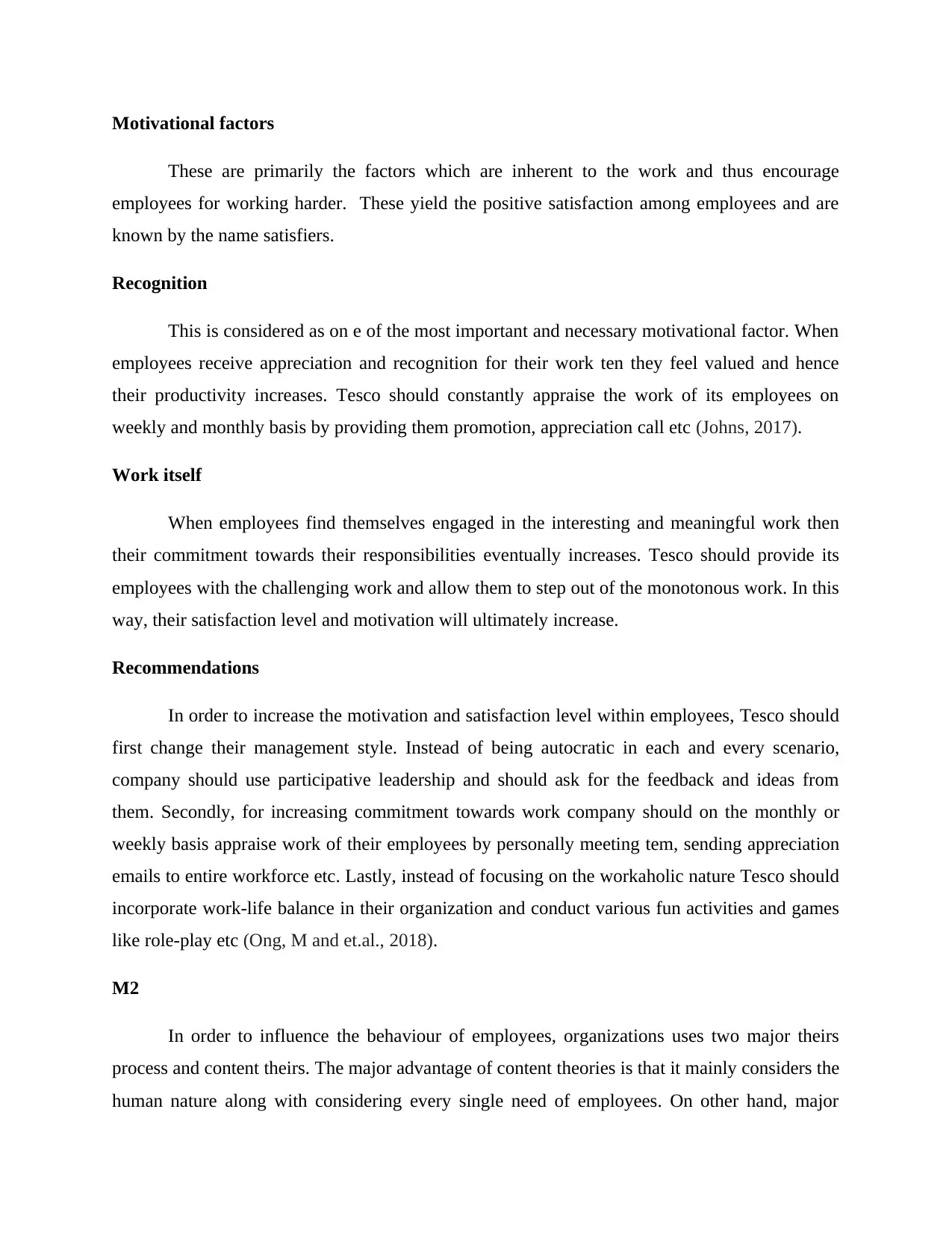
Motivational factors
These are primarily the factors which are inherent to the work and thus encourage
employees for working harder. These yield the positive satisfaction among employees and are
known by the name satisfiers.
Recognition
This is considered as on e of the most important and necessary motivational factor. When
employees receive appreciation and recognition for their work ten they feel valued and hence
their productivity increases. Tesco should constantly appraise the work of its employees on
weekly and monthly basis by providing them promotion, appreciation call etc (Johns, 2017).
Work itself
When employees find themselves engaged in the interesting and meaningful work then
their commitment towards their responsibilities eventually increases. Tesco should provide its
employees with the challenging work and allow them to step out of the monotonous work. In this
way, their satisfaction level and motivation will ultimately increase.
Recommendations
In order to increase the motivation and satisfaction level within employees, Tesco should
first change their management style. Instead of being autocratic in each and every scenario,
company should use participative leadership and should ask for the feedback and ideas from
them. Secondly, for increasing commitment towards work company should on the monthly or
weekly basis appraise work of their employees by personally meeting tem, sending appreciation
emails to entire workforce etc. Lastly, instead of focusing on the workaholic nature Tesco should
incorporate work-life balance in their organization and conduct various fun activities and games
like role-play etc (Ong, M and et.al., 2018).
M2
In order to influence the behaviour of employees, organizations uses two major theirs
process and content theirs. The major advantage of content theories is that it mainly considers the
human nature along with considering every single need of employees. On other hand, major
These are primarily the factors which are inherent to the work and thus encourage
employees for working harder. These yield the positive satisfaction among employees and are
known by the name satisfiers.
Recognition
This is considered as on e of the most important and necessary motivational factor. When
employees receive appreciation and recognition for their work ten they feel valued and hence
their productivity increases. Tesco should constantly appraise the work of its employees on
weekly and monthly basis by providing them promotion, appreciation call etc (Johns, 2017).
Work itself
When employees find themselves engaged in the interesting and meaningful work then
their commitment towards their responsibilities eventually increases. Tesco should provide its
employees with the challenging work and allow them to step out of the monotonous work. In this
way, their satisfaction level and motivation will ultimately increase.
Recommendations
In order to increase the motivation and satisfaction level within employees, Tesco should
first change their management style. Instead of being autocratic in each and every scenario,
company should use participative leadership and should ask for the feedback and ideas from
them. Secondly, for increasing commitment towards work company should on the monthly or
weekly basis appraise work of their employees by personally meeting tem, sending appreciation
emails to entire workforce etc. Lastly, instead of focusing on the workaholic nature Tesco should
incorporate work-life balance in their organization and conduct various fun activities and games
like role-play etc (Ong, M and et.al., 2018).
M2
In order to influence the behaviour of employees, organizations uses two major theirs
process and content theirs. The major advantage of content theories is that it mainly considers the
human nature along with considering every single need of employees. On other hand, major
Paraphrase This Document
Need a fresh take? Get an instant paraphrase of this document with our AI Paraphraser
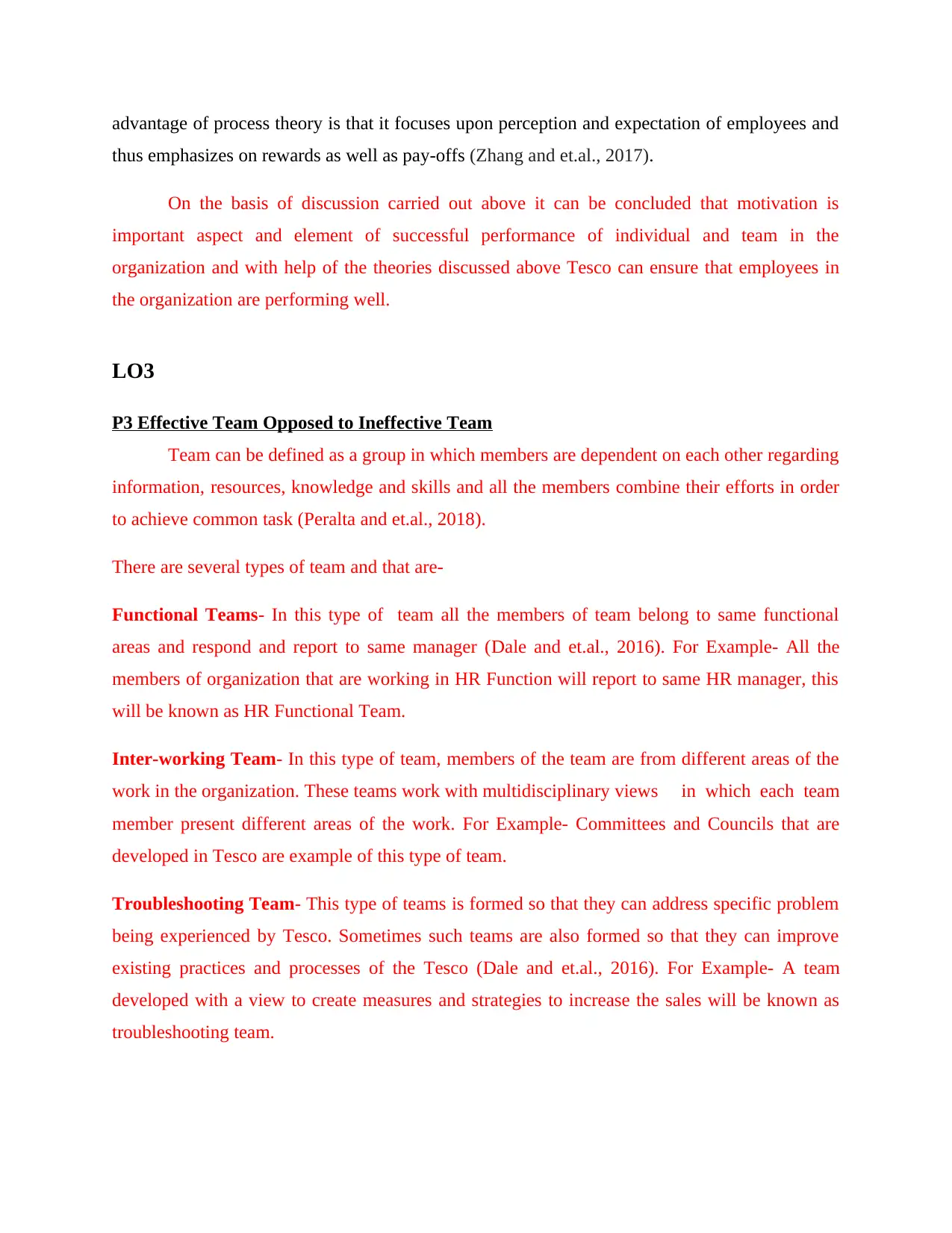
advantage of process theory is that it focuses upon perception and expectation of employees and
thus emphasizes on rewards as well as pay-offs (Zhang and et.al., 2017).
On the basis of discussion carried out above it can be concluded that motivation is
important aspect and element of successful performance of individual and team in the
organization and with help of the theories discussed above Tesco can ensure that employees in
the organization are performing well.
LO3
P3 Effective Team Opposed to Ineffective Team
Team can be defined as a group in which members are dependent on each other regarding
information, resources, knowledge and skills and all the members combine their efforts in order
to achieve common task (Peralta and et.al., 2018).
There are several types of team and that are-
Functional Teams- In this type of team all the members of team belong to same functional
areas and respond and report to same manager (Dale and et.al., 2016). For Example- All the
members of organization that are working in HR Function will report to same HR manager, this
will be known as HR Functional Team.
Inter-working Team- In this type of team, members of the team are from different areas of the
work in the organization. These teams work with multidisciplinary views in which each team
member present different areas of the work. For Example- Committees and Councils that are
developed in Tesco are example of this type of team.
Troubleshooting Team- This type of teams is formed so that they can address specific problem
being experienced by Tesco. Sometimes such teams are also formed so that they can improve
existing practices and processes of the Tesco (Dale and et.al., 2016). For Example- A team
developed with a view to create measures and strategies to increase the sales will be known as
troubleshooting team.
thus emphasizes on rewards as well as pay-offs (Zhang and et.al., 2017).
On the basis of discussion carried out above it can be concluded that motivation is
important aspect and element of successful performance of individual and team in the
organization and with help of the theories discussed above Tesco can ensure that employees in
the organization are performing well.
LO3
P3 Effective Team Opposed to Ineffective Team
Team can be defined as a group in which members are dependent on each other regarding
information, resources, knowledge and skills and all the members combine their efforts in order
to achieve common task (Peralta and et.al., 2018).
There are several types of team and that are-
Functional Teams- In this type of team all the members of team belong to same functional
areas and respond and report to same manager (Dale and et.al., 2016). For Example- All the
members of organization that are working in HR Function will report to same HR manager, this
will be known as HR Functional Team.
Inter-working Team- In this type of team, members of the team are from different areas of the
work in the organization. These teams work with multidisciplinary views in which each team
member present different areas of the work. For Example- Committees and Councils that are
developed in Tesco are example of this type of team.
Troubleshooting Team- This type of teams is formed so that they can address specific problem
being experienced by Tesco. Sometimes such teams are also formed so that they can improve
existing practices and processes of the Tesco (Dale and et.al., 2016). For Example- A team
developed with a view to create measures and strategies to increase the sales will be known as
troubleshooting team.
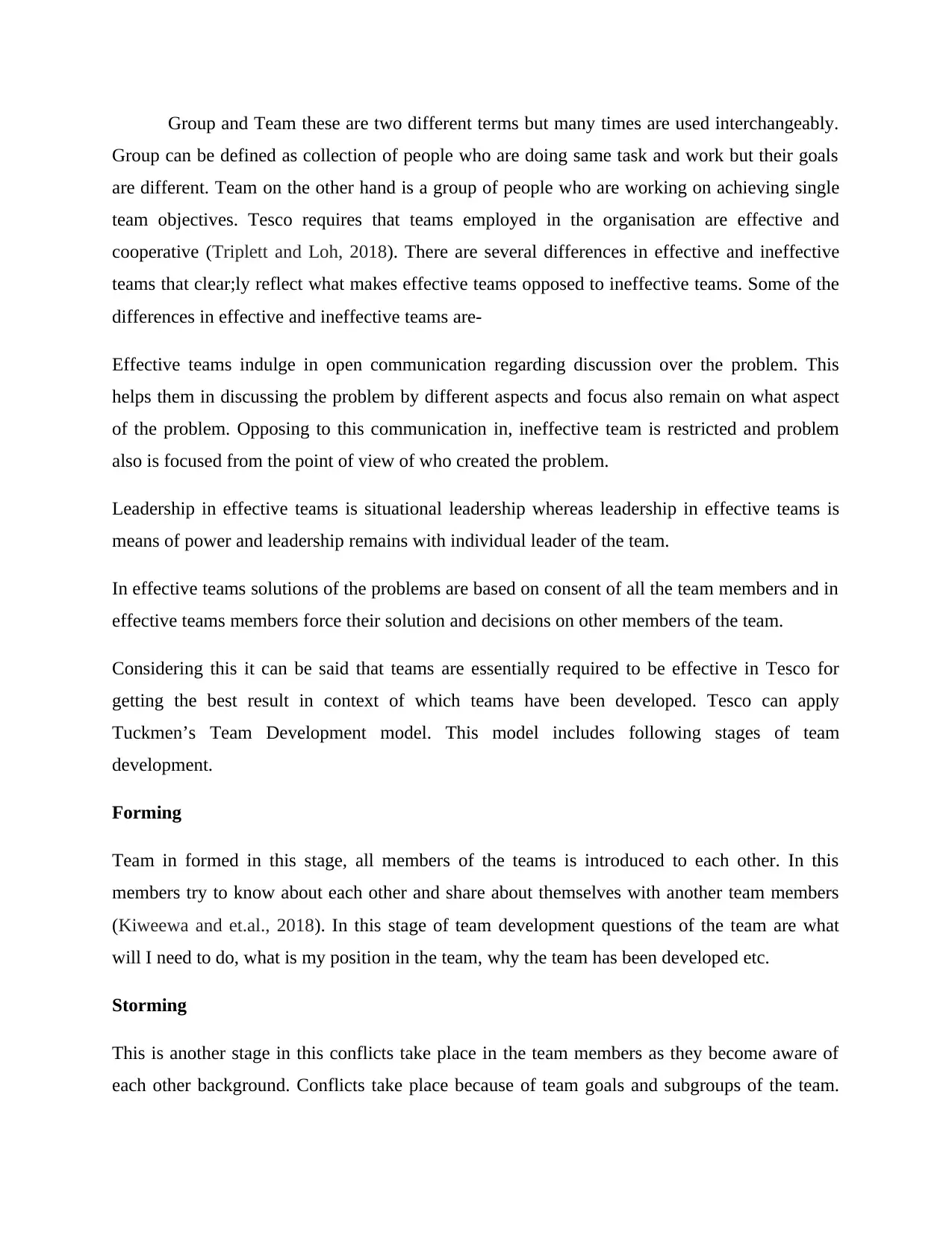
Group and Team these are two different terms but many times are used interchangeably.
Group can be defined as collection of people who are doing same task and work but their goals
are different. Team on the other hand is a group of people who are working on achieving single
team objectives. Tesco requires that teams employed in the organisation are effective and
cooperative (Triplett and Loh, 2018). There are several differences in effective and ineffective
teams that clear;ly reflect what makes effective teams opposed to ineffective teams. Some of the
differences in effective and ineffective teams are-
Effective teams indulge in open communication regarding discussion over the problem. This
helps them in discussing the problem by different aspects and focus also remain on what aspect
of the problem. Opposing to this communication in, ineffective team is restricted and problem
also is focused from the point of view of who created the problem.
Leadership in effective teams is situational leadership whereas leadership in effective teams is
means of power and leadership remains with individual leader of the team.
In effective teams solutions of the problems are based on consent of all the team members and in
effective teams members force their solution and decisions on other members of the team.
Considering this it can be said that teams are essentially required to be effective in Tesco for
getting the best result in context of which teams have been developed. Tesco can apply
Tuckmen’s Team Development model. This model includes following stages of team
development.
Forming
Team in formed in this stage, all members of the teams is introduced to each other. In this
members try to know about each other and share about themselves with another team members
(Kiweewa and et.al., 2018). In this stage of team development questions of the team are what
will I need to do, what is my position in the team, why the team has been developed etc.
Storming
This is another stage in this conflicts take place in the team members as they become aware of
each other background. Conflicts take place because of team goals and subgroups of the team.
Group can be defined as collection of people who are doing same task and work but their goals
are different. Team on the other hand is a group of people who are working on achieving single
team objectives. Tesco requires that teams employed in the organisation are effective and
cooperative (Triplett and Loh, 2018). There are several differences in effective and ineffective
teams that clear;ly reflect what makes effective teams opposed to ineffective teams. Some of the
differences in effective and ineffective teams are-
Effective teams indulge in open communication regarding discussion over the problem. This
helps them in discussing the problem by different aspects and focus also remain on what aspect
of the problem. Opposing to this communication in, ineffective team is restricted and problem
also is focused from the point of view of who created the problem.
Leadership in effective teams is situational leadership whereas leadership in effective teams is
means of power and leadership remains with individual leader of the team.
In effective teams solutions of the problems are based on consent of all the team members and in
effective teams members force their solution and decisions on other members of the team.
Considering this it can be said that teams are essentially required to be effective in Tesco for
getting the best result in context of which teams have been developed. Tesco can apply
Tuckmen’s Team Development model. This model includes following stages of team
development.
Forming
Team in formed in this stage, all members of the teams is introduced to each other. In this
members try to know about each other and share about themselves with another team members
(Kiweewa and et.al., 2018). In this stage of team development questions of the team are what
will I need to do, what is my position in the team, why the team has been developed etc.
Storming
This is another stage in this conflicts take place in the team members as they become aware of
each other background. Conflicts take place because of team goals and subgroups of the team.
⊘ This is a preview!⊘
Do you want full access?
Subscribe today to unlock all pages.

Trusted by 1+ million students worldwide
1 out of 19
Related Documents
Your All-in-One AI-Powered Toolkit for Academic Success.
+13062052269
info@desklib.com
Available 24*7 on WhatsApp / Email
![[object Object]](/_next/static/media/star-bottom.7253800d.svg)
Unlock your academic potential
Copyright © 2020–2025 A2Z Services. All Rights Reserved. Developed and managed by ZUCOL.





